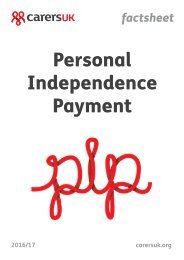data-protection-and-journalism-a-guide-for-the-media-draft
data-protection-and-journalism-a-guide-for-the-media-draft
data-protection-and-journalism-a-guide-for-the-media-draft
You also want an ePaper? Increase the reach of your titles
YUMPU automatically turns print PDFs into web optimized ePapers that Google loves.
Data <strong>protection</strong> <strong>and</strong> <strong>journalism</strong><br />
Data <strong>protection</strong> basics<br />
misused). Security measures should include physical <strong>and</strong> technical<br />
security, robust policies <strong>and</strong> procedures, <strong>and</strong> staff vetting <strong>and</strong> training.<br />
What is appropriate will depend on a risk assessment taking into account<br />
<strong>the</strong> nature of <strong>the</strong> in<strong>for</strong>mation, <strong>the</strong> harm that could be caused by a<br />
security breach, <strong>the</strong> security technology available, <strong>and</strong> <strong>the</strong> cost.<br />
You cannot rely on <strong>the</strong> <strong>journalism</strong> exemption to avoid security obligations.<br />
Principle 8: International transfers<br />
You should not send personal <strong>data</strong> to anyone outside <strong>the</strong> European<br />
Economic Area (EEA) without adequate <strong>protection</strong>. What counts as<br />
‘adequate <strong>protection</strong>’ will generally depend on <strong>the</strong> nature of <strong>the</strong><br />
in<strong>for</strong>mation, <strong>the</strong> purpose of <strong>the</strong> transfer <strong>and</strong> <strong>the</strong> legal position at <strong>the</strong> o<strong>the</strong>r<br />
end, among o<strong>the</strong>r things.<br />
Publishing in<strong>for</strong>mation on a website will count as a transfer as soon as<br />
someone outside <strong>the</strong> EEA accesses that website. However, this should not<br />
st<strong>and</strong> in <strong>the</strong> way of public interest <strong>journalism</strong>. If publication is genuinely<br />
in <strong>the</strong> public interest, <strong>the</strong> personal <strong>data</strong> should by its nature not require<br />
additional <strong>protection</strong>. And this principle does not apply at all if you can<br />
show <strong>the</strong> transfer is necessary <strong>for</strong> reasons of ‘substantial’ public interest.<br />
The section 55 offence<br />
It is an offence under section 55 of <strong>the</strong> DPA to knowingly or recklessly<br />
obtain, disclose, or procure <strong>the</strong> disclosure of personal <strong>data</strong> without <strong>the</strong><br />
<strong>data</strong> controller’s consent. This would <strong>for</strong> example cover obtaining<br />
in<strong>for</strong>mation from ano<strong>the</strong>r organisation by deception (‘blagging’), hacking,<br />
exploiting poor security, via an unauthorised leak, or employing<br />
unscrupulous private investigators who use such methods.<br />
There is a public interest defence. A court must agree that your actions<br />
were justified in <strong>the</strong> public interest. O<strong>the</strong>r available defences include a<br />
reasonable belief that <strong>the</strong> <strong>data</strong> controller would have consented if <strong>the</strong>y<br />
knew <strong>the</strong> circumstances, or showing that your actions were necessary <strong>for</strong><br />
<strong>the</strong> prevention or detection of crime.<br />
It’s important to be aware that this is not just a corporate offence:<br />
individuals can also be prosecuted. Any source leaking in<strong>for</strong>mation to you<br />
without <strong>the</strong>ir employer’s knowledge might also be liable to prosecution.<br />
DRAFT 19




